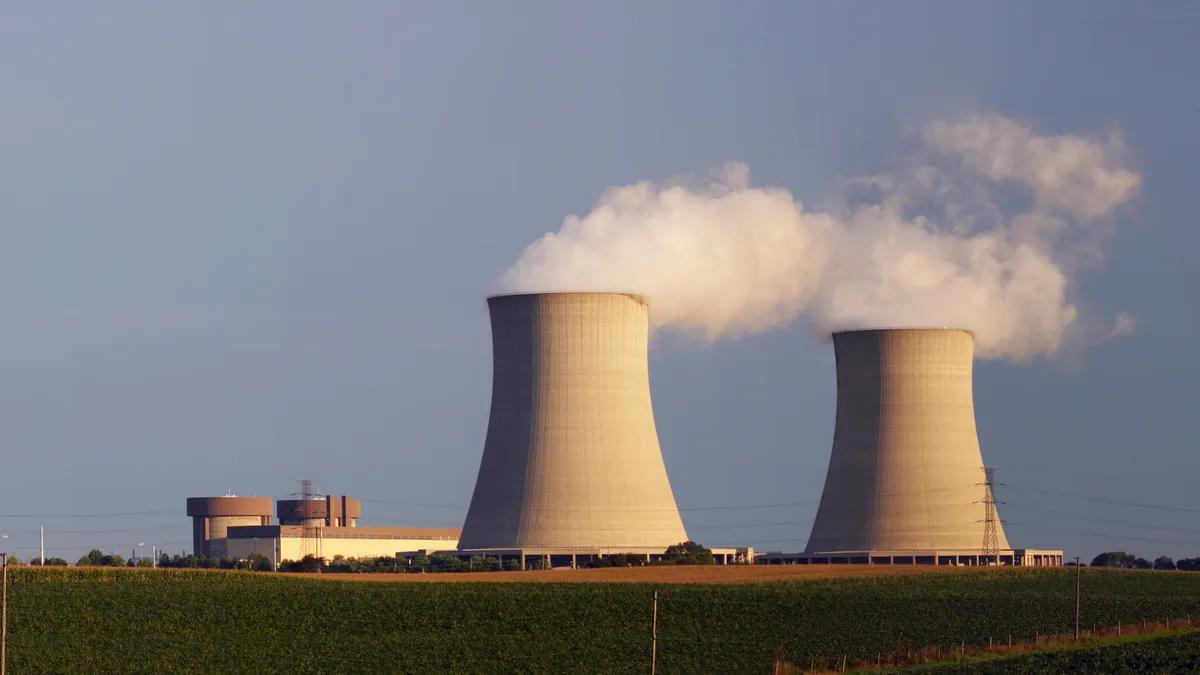Dive Brief:
- Exelon Generation has two Illinois nuclear plants slated for shutdown and decommissioning this fall, despite recent federal proposals for both a tax credit and a fund for existing nuclear plants, and rising power prices in the state.
- The company continues working with federal and state officials to keep its other nuclear generation assets in service, Exelon executives said in a quarterly earnings call on Wednesday, but they focused on the growth of the company's utility subsidiaries. Exelon Utilities, which includes gas and electric distribution utilities from the Chicago-area to the East Coast, announced a net zero emissions goal by 2050 on Wednesday.
- The company's generation arm has not issued a net zero goal, as it continues working to chart a course for any currently uneconomic nuclear plants. "Absent [state and federal] legislation, closing the plants is the right economic decision, but not an easy one," CEO Chris Crane said during the call.
Dive Insight:
Federal momentum is picking up on creating incentives for existing nuclear generation to stay online: The House and Senate introduced a $15/MWh production tax credit (PTC) for existing nuclear power plants, and the infrastructure bill now in the Senate would set aside $6 billion under the Department of Energy to support nuclear plants facing economic risks of shutdown.
"If the PTC is included in the legislation that passes later this year, it will make an enormous difference for climate and for our nuclear plants. Unfortunately, though, that will be too late for the Byron and the Dresden nuclear facilities," Crane said.
Exelon Generation submitted plans to retire the Byron and Dresden nuclear plants in Illinois with the Nuclear Regulatory Commission on July 28, detailing the restoration of the sites after shutdown this fall. The grid operator, PJM Interconnection, had confirmed that both plants can retire without putting overall grid reliability at risk in the region, but the retirements will mark the loss of 2.3 GW of clean energy in September from Byron, and nearly 1.8 GW in November from Dresden.
Exelon executives emphasized that the federal incentives, including the PTC, are only proposals at this point.
"Nothing has yet been enacted, as you know, and so while we’re watching it very closely ... and again, very grateful for the growing amount of support for preserving [the] fleet through federal legislation. ... [W]e need to make decisions based on laws that have actually been enacted, and nothing has yet come to fruition in D.C. as of yet," Kathleen Barron, Exelon's executive vice president of government, regulatory affairs and public policy, said during the quarterly call.
The company has also been working with state governments to secure a path for nuclear generation.
But the Illinois state legislation has not progressed since the legislative session ended earlier this year, and Exelon said it cannot count on future action from the state to fund the plants slated for shutdown in the next months.
"There is no regulatory path back" from starting the decommissioning process, Crane said. "You get to a point that you are running within months or so [of a shutdown]... Running [an extra] year is physically impossible. Running an extra month is very challenging... ."
The recent uptick in power prices in Illinois would not be significant enough to extend the Illinois plants for a few more months, Exelon's leadership told analysts.
"I would tell you, we have seen an uptick in energy prices many times before, never [enough to] help. And when you look at it, ... the front end of the power curve is up more materially than the back end of the power curve in terms of pricing. In addition, we have seen capacity prices decline," Joe Nigro, Exelon's chief financial officer, said during the call.
While its generation arm continues to seek solutions in the limited time left before decommissioning, the company has forecast 6% to 8% growth for Exelon Utilities.
That company anticipates moderate growth based on the outcome of multiyear rate plans recently approved in Washington, D.C., and Maryland, as well as on rate case decisions on its two gas distribution utilities. Exelon Utilities' Delaware subsidiary is anticipating an order on its rate case in the third quarter, and Illinois' ComEd and the Pennsylvania-based PECO are expected to have rate case decisions at the end of the year.
Exelon targets a 9% to 10% return on equity for all its utilities, according to Nigro. The quarter led to a composite 9.4% approved return on equity, "and that factors into our 6% to 8% projection," he said.
Throughout 2021, Exelon Utilities will deploy nearly $6.6 billion of capital, in part "to help meet our states' energy policy goals," Crane said.
The electric and gas distribution businesses could potentially move faster to decarbonize than the 2050 net zero goal, Calvin Butler, chief executive officer of Exelon Utilities, told Utility Dive. During his tenure at Exelon's Baltimore Gas & Electric, the company outpaced the goals that if had first laid out for decarbonization.















